Swiss minaret ban sends ripples worldwide
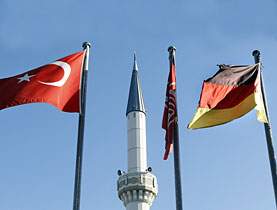
Swiss voters' decision to ban the construction of minarets has drawn worldwide criticism, with the United Nations and Council of Europe expressing outright concern.
UN Special Rapporteur on Freedom of Religion or Belief, Asma Jahangir, criticised the “clear discrimination towards the members of the Swiss Muslim community”, in a statement on Monday.
“I have serious concerns about the negative consequences of the outcome of this vote on the freedom of religion or belief of members of the Swiss Muslim community,” she said, and called for Switzerland to take the necessary measures to protect the freedom of religion.
Meanwhile a spokesman for the UN High Commission for Human Rights also confirmed on Monday that legal experts were assessing whether the ban conformed to international law. The Commission will give its position on the outcome once the legal assessment is complete.
The Council of Europe Parliamentary Assembly said the Swiss referendum outcome risked “promoting feelings of exclusion and deepening divisions” in society.
“The decision, although an expression of popular opinion, is a source of serious concern,” said Lluís Maria de Puig, president of the assembly, in a statement.
This vote is “testimony to the fears at the heart of the Swiss population – and Europe in general – towards Islamic integration”, and the result goes against the values of tolerance, dialogue and respect for others’ beliefs, which the Council seeks to uphold, he said.
The vote on Sunday was backed by 57.5 per cent of Swiss voters and a majority of cantons. Turnout was high, at around 53 per cent.
Negative signal
French Foreign Minister Bernard Kouchner appealed for the Swiss to go back on the decision, which he described as a “show of intolerance”. He said he was “a bit scandalised” by the ban, which amounted to “oppressing a religion”.
Sweden, holding the presidency of the European Union, also came out strongly against the result. Integration Minister Nyamko Sabuni said voting on the issue had been “an abuse of the Swiss voting system”, while the Swedish foreign minister Carl Bildt said it was a “display of prejudice and perhaps even of fear … at all levels a negative sign”.
Tobias Billström, the Swedish migration minister, added that it was rare to make such a decision by referendum, with issues such as building height or location usually the domain of town planners. The Austrian interior minister, Maria Fekter, agreed.
Italian Foreign Minister Franco Frattini said he was “greatly concerned” at the signal the vote sent to the Islamic world.
For Germany the outcome demonstrated that there was fear of Islamicisation, which needed to be “taken seriously”, said Wolfgang Bosbach, head of the German parliamentary internal affairs commission. But Christoph Steegmans, spokesman for the German Chancellery, said the government was “certain that freedom of religion was as important in Switzerland as it is to us”.
Dutch far-right politician Geert Wilders followed the result by calling for the Netherlands to organise its own referendum on the issue, saying: “Whatever is possible in Switzerland could equally be done here.”
“Distorted image of Islam”
Elsewhere, the Vatican told the BBC on Monday that it endorsed a statement by the conference of Swiss Bishops criticising the vote for heightening “the problems of cohabitation between religions and cultures”.
In Lebanon, influential Shi’ite cleric Ayatollah Mohammad Hussein Fadllallah issued a statement calling the vote racist, and the fruit of a “propaganda campaign aimed at presenting a distorted and frightening image of Islam to the Swiss public”. He urged Swiss Muslims not to respond with violence to the outcome.
In Indonesia, the world’s biggest Muslim-majority country, the head of the country’s largest Muslim group Maskuri Abdillah said the vote was a “manifestation of religious hatred”, but called for followers “not to respond with excess”.
Jana, the official news agency in Libya, which is in the midst of ongoing diplomatic spat with Switzerland, issued a statement saying it exposed Switzerland’s racist side and enshrined in law a “racist religious action”.
Swiss Justice Minister Eveline Widmer-Schlumpf, attending a gathering of European Union justice ministers on Monday, was forced on the back foot and had to explain to her counterparts that Sunday’s referendum vote was not “a referendum against Islam … but a vote directed against fundamentalist developments”.
Widmer-Schlumpf noted that it was foreseeable that an appeal against the ban could be lodged with the European Court of Human Rights.
Jessica Dacey, swissinfo.ch

More
People’s initiative
Minaret ban – final results:
57.5% yes
42.5% no
Turnout: 53.4%
Four cantons carried out trials with e-voting. The Swiss abroad registered in Geneva and Basel City were also taking part in the scheme.
Switzerland has become the first European country to ban the construction of minarets.
The proposal was launched by members of the rightwing Swiss People’s Party and the ultra conservative Federal Democratic Union.
The initiative came in response to opposition by conservative groups at a local level against applications to build a minaret next to a mosque.

In compliance with the JTI standards
More: SWI swissinfo.ch certified by the Journalism Trust Initiative

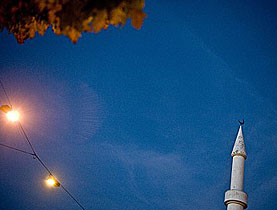
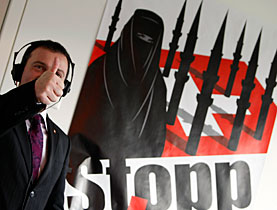
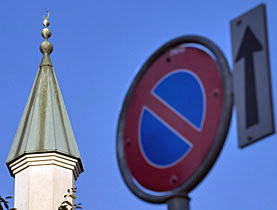
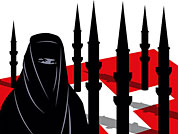
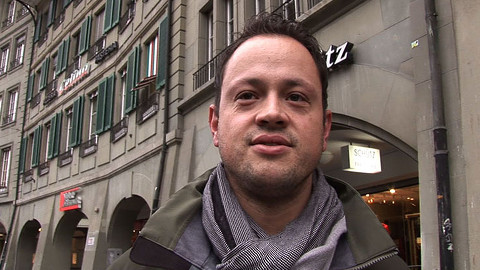
You can find an overview of ongoing debates with our journalists here . Please join us!
If you want to start a conversation about a topic raised in this article or want to report factual errors, email us at english@swissinfo.ch.